GreenTech coming to North America
I think this is exciting news for those of us who like to keep up with the latest in greenhouse technology: GreenTech, the big Dutch automation show, is coming to the Pennsylvania Convention Center in Philadelphia September 23-24, 2026. This trade show will focus on “sustainable and high-tech horticulture solutions, bringing together major producers and growers” of ornamentals, vegetables, leafy greens, soft fruits and medicinal plants, with the goal of showcasing innovations, sharing knowledge and creating business opportunities.
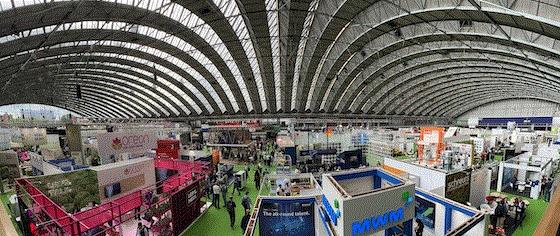
It'll join GreenTech Amsterdam (the original event, first launched in 2014 and pictured above) and GreenTech Americas (held in Mexico and launched in 2020).
The show will start small—they’re expecting 90 exhibitors and 1,000 attendees—but the organizers, RAI Amsterdam, said they have the support of leading associations, such as CEA Alliance, FarmTech Society, the Resource Innovation Institute, the Commonwealth of Pennsylvania and Pennsylvania Department of Agriculture, Honorary Consul Philadelphia, Kingdom of the Netherlands, and Philadelphia Convention & Visitors Bureau. The Controlled Environment Agriculture Alliance will hold its fall board meeting alongside GreenTech North America 2026.
Why here? Well, why not! Market research shows strong growth potential for high-tech CEA in North America, with more than 47,000 greenhouse operations and an annual growth rates of 5% to 7% (not sure where they got that figure …)
Now, I like the idea of the event—I’ve been to GreenTech Amsterdam and it’s the best single place to see greenhouse technology since Horti Fair closed its doors in 2013. But the reason GreenTech Amsterdam works is because so much of the highest of the high-tech, like the robotics firms, comes from the Netherlands and Europe, so it’s easy for manufacturers to exhibit their cool stuff. Plus, visitors can get out and tour factories and greenhouses. Will we get those folks to come here? Or will we be seeing the same exhibitors we can see at Cultivate in Columbus every summer? I guess time will tell.
Anyway, for more, CLICK HERE.

Jen, on the impact we have on Washington
Editor Jen Zurko, our intrepid political junkie, attends AmericanHort’s Impact Washington. Here’s her Inside-the-Beltway report:
By now, with this being my tenth time on Capitol Hill for a fly-in event, I’m an old pro at going into policymakers’ offices and covering the issues that affect our industry. But this was the first time I was able to be a part of the press corps during a House congressional hearing!
Last week, I attended AmericanHort’s biennial legislative event, Impact Washington, which was sold out for the first time, with 140 participants from 25 states and more than 220 meetings with lawmakers on Capitol Hill. As it turned out, AmericanHort was also invited to have a representative come and testify in front of the House Agriculture Committee to discuss specialty crops and some of the challenges growers have in this segment.
That representative was Michael Frantz, president of Frantz Wholesale Nursery in Hickman, California. Michael is no rookie, either—he’s active in promoting his business to local and federal legislators, is a past chairman of AmericanHort’s Advocacy Committee, and is always in attendance at Impact Washington. I first met Michael about 10 years ago, so I knew he was an excellent choice to represent the floriculture and nursery sector.
“I thought it was a real honor to be able to speak on behalf of American nurseries and garden centers across the country. And I was quick to say yes,” said Michael. “And I think we got to give credit where credit is due and that's to Matt Mika and Ken Fisher for having the relationship with Chairman Thompson to get the invitation.”
Three other ag professionals also testified: representing the International Fresh Product Association was Dana Brennan, VP of corporate affairs for Grimmway Farms; Dr. Tim Boring, director of the Michigan Department of Agriculture & Rural Development, was representing the National Association of State Departments of Agriculture; and Dr. Ramesh Sagili, professor of horticulture at Oregon State University, was representing specialty ag in general.
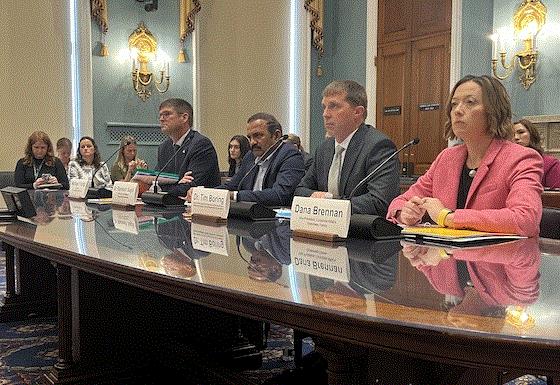
The panel testifying in front of the House Ag Committee. From left to right: Michael Frantz, Dr. Ramesh Sagili, Dr. Tim Boring and Dana Brennan.
The chairman of the House Ag Committee, Rep. GT Thompson (R-PA), started the hearing, acknowledging that specialty crops play a critical role in agriculture. “I support this essential sector,” he said. Ranking member Rep. Angie Craig (D-MN) agreed, saying, “I appreciate this bipartisan hearing.”
Each of the speakers gave a four-minute opening statement. Michael spoke about his business and his experience in advocating for it. Even though Frantz Wholesale Nursery grows more than 700 different varieties of trees and shrubs, he doesn’t qualify for some of the disaster relief available to big ag operations. He talked about the need for additional funding for specialty crop research, which should be part of the next Farm Bill; and that tariffs and the uncertainty around the constant changes have made it difficult to plan and afford inputs that his business has used for years, like peat moss and coconut coir for growing media. He thanked the committee for including peat moss in one of the ag exemptions, but said more needs to be added to that list.
Michael and the rest of the panel answered questions from the 50 members of the Ag Committee for 3 1/2 hours. It was truly going through the gauntlet, as members and aides were coming and going in and out of the chamber the whole time. And because not all of the members are in the chamber at the same time, Michael and the other panelists had to answer similar questions multiple times. But he said that AmericanHort’s Rachel Pick and Kamron Newberry sat with him the day before to make sure he was fully prepared, going through multiple scenarios and coaching him on what to say (and what not to say).
“I went into it very nervous—the room is built to be intimidating and it is—but within an hour, my nerves calmed down,” he said.
I asked Michael how he felt about it afterwards, after navigating the intimidation factor and being, at times, in the middle of some not-so-subtle swipes from members when it was their turn to ask questions. There was something that he expressed that’s been severely lacking in our recent body politic: hope and optimism.
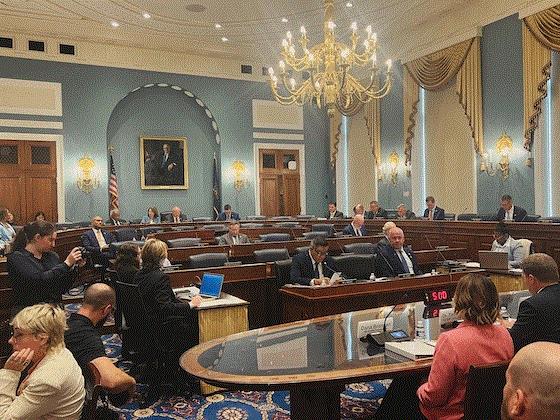
The chamber of the House Agriculture Committee. It’s designed to be intimidating.
“There’s definitely some partisan gamesmanship going on in the room, but, in general, I was heartened,” Michael replied. “The Ag Committee is traditionally always a bipartisan group. I felt good that I was able to deliver the key messages that I believe are important to our industry. Whether they choose to act on passing a Farm Bill, resolving our workforce issues, tariff relief, price stability, all these things that you heard me hammer over and over again, of course, is outside of my control. But I’m so grateful that we had a seat at the table and that I was able to articulate from a first-person perspective how great the needs are.”

Impact Washington (continued)
After the hearing, Michael and the rest of the California delegation had their regularly scheduled meetings on the Hill with their members’ offices. He was pleasantly surprised that all the legislative aides knew that he testified in front of the Ag Committee and that they watched it. Also, Michael isn’t a stranger to these offices—again, he’s been playing at this game for more than a decade, and that repeated and direct face-time does make a difference.
“I understand how easy it is to get cynical, but I encourage [other growers] to get involved because I continue to believe we can make a difference,” said Michael. “At that hearing, it was amazing to me how attentive these very busy people were. It seemed to me that there was engagement there, there was interest there. Same thing on a couple of our one-on-one meetings. Every once in a while, you seem to connect at a human level, and I think it matters.”
Yes, any sort of advancement on policy can be very slow. Think of it like trying to chip away at a big mountain with a small hammer—with just one person, it would take forever. But if you had a bunch of people chipping away at the same mountain, eventually you begin to see some progress.
“Getting these folks’ cell phone numbers, having the ability to interact with them, inviting them out to your nursery, contributing to AmericanHort’s PlantPAC or contributing directly to your Congress member—even if it’s only a couple hundred dollars—getting on their radar as a funder of their campaign matters personally to them,” said Michael. “And I do believe that with consistent messaging you can make a difference.”
You can watch the recording of Michael’s testimony in front of the House Ag Committee HERE.

The messages we delivered to Washington
For our meetings on the Hill, I was really proud of the representation from the Illinois delegation—we had 19 industry members knocking on our legislators’ doors and sitting down with their staff to discuss the most pressing issues affecting the specialty crop sector. The other 121 Impact Washington attendees did the same for their respective states. The legislative agenda we all presented to our representatives included:
- Workforce and labor. Alleviating the challenges of the H-2A visa program, including the rising demand, escalating costs and the Adverse Effect Wage Rate. Chairman of the Ag Committee GT Thompson (R-PA) and the bipartisan Agricultural Labor Working Group are currently working together to craft legislation that would address these issues.
- Specialty crop priorities to be included in the next Farm Bill. The last Farm Bill to pass was in 2018 and a lot has changed and needs to be added. Members expressed optimism that a new one will be passed by the end of the year.
- Tariff exemptions for key horticultural inputs, including on young plants/URC, plastic pots and containers, irrigation equipment, and machinery.
- Increase funding for specialty crop research, including with IR-4.
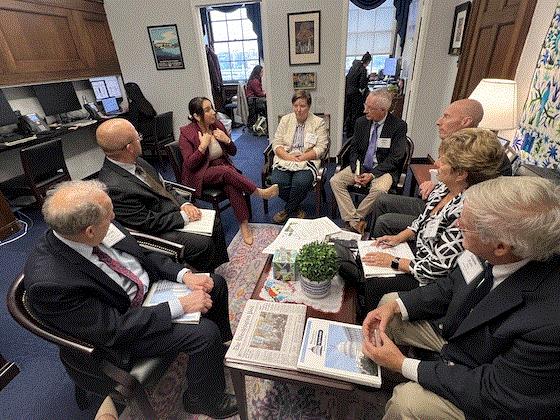
Half of the Illinois delegation with Rep. Delia Ramirez. (There were so many of us from Illinois we had to split up.) Ball’s headquarters is in her district.
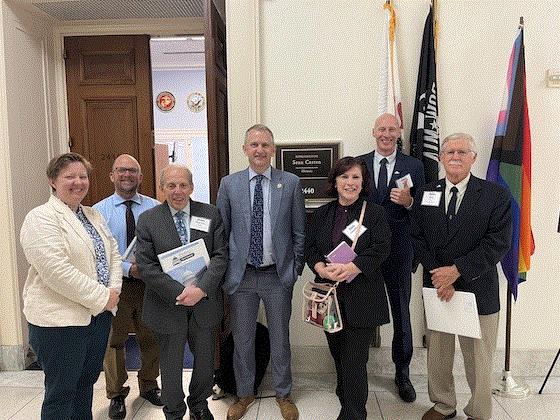
With Rep. Sean Casten.
What Michael Frantz said about engagement with your policymakers is absolutely true: The more you do it, the more you see the benefits. Ball Horticultural Company’s West Chicago headquarters is in Congresswoman Delia Ramirez’s district. Although she’s only in her second term, she’s getting to know us and makes a point to meet with us directly whenever we come to her office, especially since a few of us in the delegation are also her constituents who live in her district. We invited Rep. Ramirez to visit Ball, so we’ll be working with her scheduler to coordinate a time for her to come see us soon.
Congressman Sean Casten’s district moved further south after the re-districting in 2020, but he's visited Ball, so he came out to greet us.

Meet AIPH’s latest Board of Directors
During the 77th AIPH Annual Congress in Ghent, Belgium, members of the International Association of Horticultural Producers (AIPH) re-elected Leonardo Capitanio (right) as President and elected Jack Goossens as its new Vice-President.
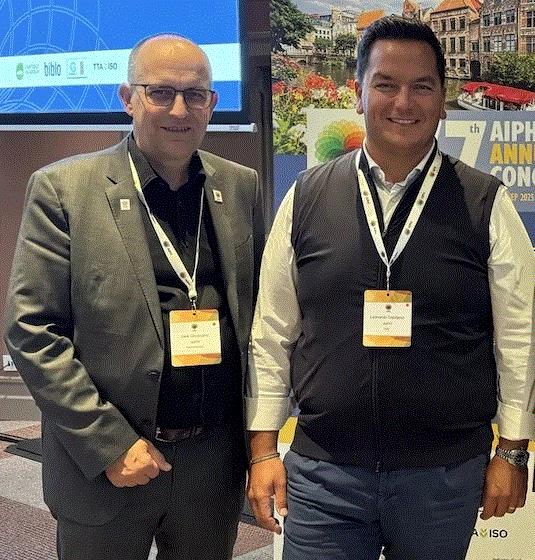
An Italian ornamental plant grower, Leonardo Capitanio has always been involved in horticulture. He grew up on his father’s farm in Monopoli, Italy, and took over the nursery at the age of 18. From 2018-2022 he served as the President of ANVE, Italy’s association of ornamental plant exporters, and in 2022 he was elected as President of AIPH and has since facilitated the association’s growth.
For close to 30 years, Jack Goossens has served as co-owner with his brother of Gova BV, a family-run Dutch nursery that specializes in Laurus nobilis. His practical experience as a third-generation grower is complimented by international managerial skills due to his time spent as the Chairman of the Supervisory Board for the big Dutch auction company Royal FloraHolland.
In 2021, Jack joined AIPH’s Board of Directors as the representative for Region II (Southwest Europe). He also serves as the Chair of the Ornamentals Production Committee, which focuses on plant-breeders’ rights, novelty protection and sustainability in horticulture.
Other changes to the Board include the election of Wang Youfei as the representative of Region VII (East Asia). Based in Beijing, Wang has worked for the China Flower Association (CFA) for the past 10 years. His responsibilities involve organizing International Expos, including the AIPH-approved Expo 2019 Beijing, Expo 2021 Yangzhou and Expo 2024 Chengdu.
Since 1948, the UK-based International Association of Horticultural Producers has supported the work of grower associations globally, championing a prosperous industry, growing plants that enhance lives, advance societies and sustain our planet (they're the association of hort associations). AIPH is also the global approving body for International Horticultural Exhibitions, which are hosted by cities around the world.

A garden show in … Baghdad?
If I can report on a big garden Expo in Minnesota, I can be fair and tell you about one coming up in Baghdad, Iraq. Yes, Iraq. Because the aforementioned AIPH has approved another garden expo called Expo 2029 Garden in Baghdad. It'll open in October 2029 on a 375-hectare site along the Tigris River, a region historically known as Mesopotamia.
I’ll tell you a bit more, but first, this travel advisory: If you are a U.S. citizen, the State Department lists Iraq at its highest “Level 4: Do Not Travel.” Of course, that’s now; perhaps the status will be downgraded to Level 3, like Jamaica and Nicaragua, or even Level 2, like most of Europe, by the time the event begins. But, for now, I am saying you maybe shouldn't put it on your bucket list!

No artist's renderings of the expo grounds yet, but this historical view of the Tigris should give you an idea that it'll be something to see.
Anyway, this will be an International Green Expo, meaning a large-scale, temporary event that showcases horticultural excellence and promotes green city principles on a global scale. Scheduled to run from October 1, 2029 to April 1, 2030, the Expo will transform a 375-hectare site along the Tigris River into a global platform for horticulture, culture and innovation. The masterplan includes cultural gardens, business centers, national pavilions and renewable energy projects. Organizers hope to attract 50 participating countries and 12 million visitors (including 4 million from outside Iraq).
Dang, it would be interesting to be one of those 4 million and say you’ve been to Mesopotamia, eh?

ASHS presents awards to excellent Ph.D.s
We love our university research, extension and education specialists—and our industry Ph.D.s as well! Our magazines and newsletters are that much richer thanks to their expertise and research findings. Which is why we join the American Society for Horticultural Science (ASHS) in honoring the following award recipients, who were formally recognized at the organization’s annual conference in New Orleans, Louisiana, this summer.
Outstanding Extension Educator—Dr. Roberto Lopez, Michigan State University
The ASHS Outstanding Extension Educator Award recognizes an educator who's made an outstanding and valuable contribution to horticultural science extension education for a period of 10 or more years.
Outstanding Graduate Educator—Dr. Rhuanito Ferrarezi , University of Georgia
The ASHS Outstanding Graduate Educator Award recognizes an educator who's had a distinguished and outstanding graduate education teaching career in horticultural science for a period of 10 or more years.
Outstanding Industry Scientist—Dr. Alicain Carlson, Syngenta Flowers
The ASHS Outstanding Industry Scientist Award recognizes a horticultural crops scientist working in the private sector who's made outstanding and valuable contributions to horticultural science, the horticultural industry and the horticultural profession for a period of 10 or more years.
Outstanding Undergraduate Educator—Dr. Marvin Pritts, Cornell University
The ASHS Outstanding Undergraduate Educator Award recognizes an educator who's had a distinguished and outstanding undergraduate education teaching career in horticultural science for a period of 10 or more years.
Outstanding Researcher—Dr. Genhua Niu, Texas A&M University
The ASHS Outstanding Researcher Award recognizes a horticultural crops scientist who's had an outstanding record in research on one or more horticultural crops and in one or more areas of horticultural research for a period of 10 or more years.
Outstanding International Horticulturalist—Dr. Steven Sargent, University of Florida
The ASHS Outstanding International Horticulturist Award recognizes an international horticulturist who's made an outstanding and valuable contribution to international horticultural science, education, research and/or outreach for a period of 10 or more years.
Outstanding Leadership & Administration—Dr. Leonardo Lombardini, University of Georgia
The ASHS Outstanding Leadership and Administration Award recognizes sustained outstanding and effective leadership and administration contributing to the progress of professional horticulture and having impact at the regional or national level. The award should recognize and promote interest and appreciation for sustained careers with superior leadership and administration for the improvement of horticultural science.
Congrats to all these fine academics. Thank you for all you do for our industry!

Garden center chain to phase out most chemically treated plants
Dutch garden center chain Intratuin, which operates 57 garden centers in the Netherlands, three in Belgium and 11 in Germany, has announced a goal (or at least an ambition) to have 70% of its plant product lines chemical-free by 2030.
Intratuin, a major player in the retail industry in Europe, is an organization committed to taking sustainable responsibility.
“We're intrinsically driven when it comes to greening the world,” said Elise Wieringa, sustainability manager for Intratuin. “It's ridiculous that we're using more and more biological pest control in horticulture, but then those natural predators are killed before the plants reach the store. We want to change that!”
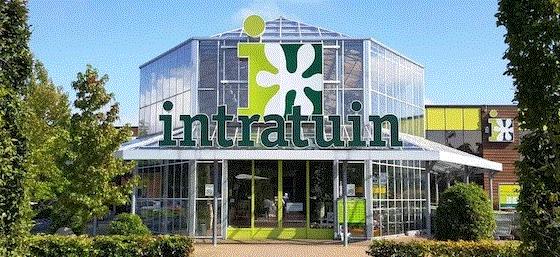
Elise explained that Intratuin knows it’s a big ask and a big challenge, and they’re committed to working with growers.
“That's why we’re primarily focusing on segmenting our product range. That won't happen overnight. We have a conventional range and an organic range, and then there’s a very large group of growers working in various ways to reduce their use of chemicals. They do this independently or in collaboration with other growers, for example, within a cooperative. We try to connect these initiatives as much as possible, so they can make bigger strides together … We’re offering support where necessary. But, above all, we want to give entrepreneurs the space to achieve this themselves.”
Elise continued, “With one crop, it’s easier to reduce the use of insecticides, but it’s more difficult to do the same with fungicides. With another product, the growth regulator might be the problem. There’s no single template to roll out our ambitions. Also, we’re in discussions with growers about the varieties they offer. One product variety can be more sensitive to diseases than another. Then why don’t we switch to that other variety that requires less chemicals?”
Elise said this initiative comes from critical questions by customers, especially the Dutch.
“We’re also receiving more critical questions from consumers. These questions are almost always about chemicals. Never about peat or [carbon] footprints. Consumers want a chemical-free plant or an organic plant that has a smaller negative or a larger positive impact on biodiversity. It's important that growers realize this.”
It’s not all negative for growers. Those who comply will get more prominent placement of their plants. And Intratuin is also making internal changes, implementing biological pest control at their garden centers.
“That’s quite a challenge. We don’t have just one product, but many different plants in warm and cold conditions. Some things are already going very well, others aren’t. But you learn a lot from these kinds of projects. And with that knowledge, we can also answer consumer questions in a better way.”
In one more interesting move, Intratuin is also making its communication more transparent. Starting in 2027, references such as “bee-friendly” will no longer be allowed on products, even if they attract pollinators.
“Because if a plant has chemicals on it, it’s not good for bees, even if the product itself is.”

Wadsworth expands its Juniper controls

I wrote about Juniper in my Cultivate’25 coverage; it’s Wadsworth Control’s modern version of its venerable STEP 50 platform, perfect for growers looking to automate their environmental controls, but who don’t need a more complex integration, like for irrigation or lighting (which is available through Wadsworth’s more robust Seed control unit).
Juniper offers automation without the complexity or high cost of full-scale systems, managing heating, cooling, venting and curtain controls through a touchscreen interface. Juniper also connects to Wadsworth.Cloud, enabling secure remote access, alarms and data logging from anywhere.
Juniper gets two new features:
- Weather Station Add-On. Juniper can now connect to our weather stations, providing protection for your greenhouse and the crops. Two options are available: the full Weather Station and the Mini Weather Station, which has the three most critical sensors, temperature, wind speed and precipitation.
- JumpStart. Delivers standard panels for the fastest turnaround—perfect when you need a quick replacement controller or a rapid greenhouse install without delays.
“We installed Juniper to replace our STEP 50 and it’s a major upgrade,” said Harry Vlotter of Blooma Farms of Arvada, Colorado. “I walk in and know what’s happening instantly. It’s one less thing to worry about.”

Global Produce & Floral Show is October 16-18 in Anaheim
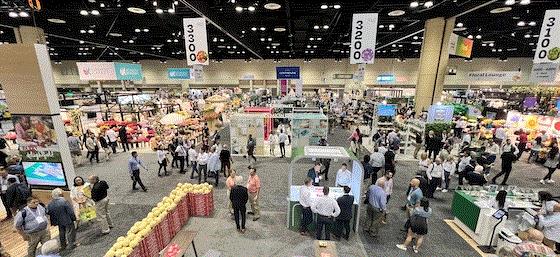
While I can't recommend Baghdad, anyone in the plant business should want to check out Anaheim for the annual Global Produce & Floral Show, hosted by the International Fresh Produce Association. It’s where all the big supermarket buyers go to find produce and floral products, and it’s loaded with ideas and inspiration. Plus, lots of healthy and refreshing snacks!
The event rotates across the country; this year, it’s in Anaheim, California, October 16-18. You won’t be alone if you attend, as there'll be something like 20,000 other folks there from 70 countries to see the 1,000 exhibitors.
And besides the massive trade show and all the big-name produce and floral exhibitors, there are some great learning opportunities via the Education Festival, a dynamic, fast-paced learning experience “designed to help you unlock new insights and apply them to your priorities.”
Topics include:
- Supply Chain of the Future
- Global Trade
- Supply Chain Transformation
- Global Economic Forces Shaping Produce & Floral
- Regenerative Agriculture Market Opportunities
- Turning Consumer Insights into Produce Growth
- The New Role of Healthcare in Changing Diet
- Mastering Global Leadership
Learn more and register HERE.




Feel free to email me at beytes@growertalks.com if you have ideas, comments or questions.
See you next time!

Chris Beytes
Editor-in-Chief
GrowerTalks and Green Profit
This e-mail received by 29,752 loyal readers!
Thanks to my loyal sponsors, who help me reach the 29,752 readers of Acres Online in more than 60 countries. Want to be one of them (a sponsor, that is)? Give Kim Brown a shout and she will tell you about our many advertising opportunities.